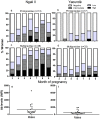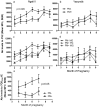High avidity antibodies to full-length VAR2CSA correlate with absence of placental malaria
- PMID: 22761948
- PMCID: PMC3383675
- DOI: 10.1371/journal.pone.0040049
High avidity antibodies to full-length VAR2CSA correlate with absence of placental malaria
Abstract
VAR2CSA mediates sequestration of Plasmodium falciparum-infected erythrocytes in the placenta, increasing the risk of poor pregnancy outcomes. Naturally acquired antibodies (Ab) to placental parasites at delivery have been associated with improved pregnancy outcomes, but Ab levels and how early in pregnancy Ab must be present in order to eliminate placental parasites before delivery remains unknown. Antibodies to individual Duffy-binding like domains of VAR2CSA have been studied, but the domains lack many of the conformational epitopes present in full-length VAR2CSA (FV2). Thus, the purpose of this study was to describe the acquisition of Ab to FV2 in women residing in high and low transmission areas and determine how Ab levels during pregnancy correlate with clearance of placental parasites. Plasma samples collected monthly throughout pregnancy from pregnant women living in high and low transmission areas in Cameroon were evaluated for Ab to FV2 and the proportion of high avidity Ab (i.e., Ab that remain bound in the presence of 3M NH(4)SCN) was assessed. Ab levels and proportion of high avidity Ab were compared between women with placental malaria (PM(+)) and those without (PM(-)) at delivery. Results showed that PM(-) women had significantly higher Ab levels (p = 0.0047) and proportion of high avidity Ab (p = 0.0009) than PM(+) women throughout pregnancy. Specifically, women with moderate to high Ab levels (>5,000 MFI) and those with ≥ 35% high avidity Ab at 5-6 months were found to have 2.3 (95% CI, 1.0-4.9) and 7.6-fold (p = 0.0013, 95% CI: 1.2-50.0) reduced risk of placental malaria, respectively. These data show that high levels of Ab to FV2, particularly those with high avidity for FV2, produced by mid-pregnancy are important in clearing parasites from the placenta. Both high Ab levels and proportion of high avidity Ab to FV2 may serve as correlates of protection for assessing immunity against placental malaria.
Conflict of interest statement
Figures



References
-
- Brabin BJ, Romagosa C, Abdelgalil S, Menéndez C, Verhoeff FH, et al. The sick placenta-the role of malaria. Placenta. 2004;25:359–378. - PubMed
-
- McGregor IA. Epidemiology, malaria and pregnancy. Am J Trop Med Hyg. 1984;33:517–525. - PubMed
-
- McGregor IA. Thoughts on malaria in pregnancy with consideration of some factors which influence remedial strategies. Parassitologia. 1987;29:153–163. - PubMed
Publication types
MeSH terms
Substances
Grants and funding
LinkOut - more resources
Full Text Sources

